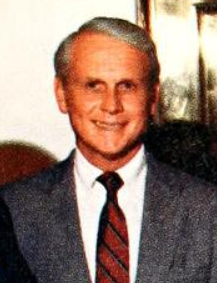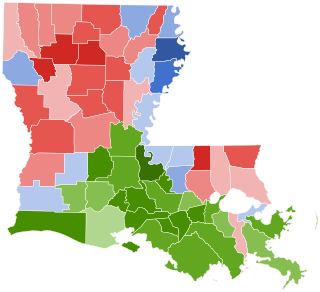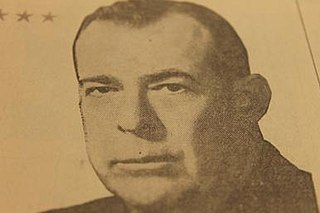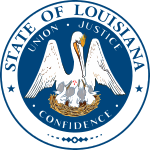
David Conner Treen Sr. was an American politician and attorney from Louisiana. A member of the Republican Party, Treen served as U.S. Representative for Louisiana's 3rd congressional district from 1973 to 1980 and the 51st governor of Louisiana from 1980 to 1984. Treen was the first Republican elected to either office since Reconstruction.

The 1944 Louisiana gubernatorial election was held in two rounds on January 18 and February 29, 1944. Like most Southern states between the Reconstruction Era and the Civil Rights Movement, Louisiana's Republican Party was virtually nonexistent in terms of electoral support. This meant that the two Democratic Party primaries held on these dates were the real contest over who would be governor. The 1944 election saw the reformer ‘anti-Long’ faction retain power for another four years under Jimmie Davis.

The 1956 Louisiana gubernatorial election was held on January 17, 1956. Incumbent governor Robert F. Kennon was ineligible to run for a second term in office. Earl K. Long won the Democratic primary, which was tantamount to election, securing his second full term as Governor of Louisiana. He received over 50% of the vote, defeating his opponents so soundly that no runoff vote was needed. His closest competitor was New Orleans mayor deLesseps Story Morrison.

The 1964 Louisiana gubernatorial election was held on March 3, 1964. Democrat John McKeithen won a highly-competitive primary and dispatched Republican Charlton Lyons in the general election, though Lyons made a historically good showing for a Louisiana Republican up to this point.

The 1960 Louisiana gubernatorial election was held on April 19, 1960.

The 1924 Louisiana gubernatorial election was held in two rounds on January 15 and February 19, 1924. Like most Southern states between the Reconstruction Era and the Civil Rights Movement, Louisiana's Republican Party was virtually nonexistent in terms of electoral support. This meant that the two Democratic Party primaries held on these dates were the real contest over who would be governor. The 1924 election saw Henry L. Fuqua defeat Hewitt Bouanchaud to become Governor of Louisiana, and saw the beginning of the political rise of Huey P. Long Jr., who came in a surprisingly strong third.

United States gubernatorial elections were held in four states. Kentucky and Mississippi held their general elections on November 4. Louisiana held the first round of its jungle primary on October 4 and the runoff on November 15. In addition, California held a recall election on October 7.

United States gubernatorial elections were held on November 5, 2002, in 36 states and two territories. The Republicans won eight seats previously held by the Democrats, as well as the seat previously held by Minnesota governor Jesse Ventura, who was elected on the Reform Party ticket but had since renounced his party affiliation. The Democrats won 10 seats previously held by the Republicans, as well as the seat previously held by Maine governor Angus King, an independent. The elections were held concurrently with the other United States elections of 2002.

The 1932 Louisiana gubernatorial election was held on January 19, 1932. Like most Southern states between the Reconstruction Era and the Civil Rights Movement, Louisiana's Republican Party had virtually no electoral support. This meant that the Democratic Party primary held on this date was the real contest over who would be governor. The election resulted in the election of Oscar K. Allen as governor of Louisiana. Louisiana was one of only two states that held the election on a date other than the first Tuesday following the first Monday of November.

Foster Lonnie Campbell Jr. is an American politician and member of the Democratic Party from the U.S. state of Louisiana. Since 2003, he has been a member of the Louisiana Public Service Commission. He served in the Louisiana State Senate from 1976 to 2002.

Clarence C. "Taddy" Aycock, an American conservative Democrat from Franklin in St. Mary Parish, was the only three-term lieutenant governor in 20th century Louisiana history. He served from 1960 to 1972. Aycock failed in his only bid for governor in the 1971 Democratic primary. Few lieutenant governors in Louisiana have been elected directly to the governorship; former Governor Kathleen Babineaux Blanco of Lafayette, is a prominent exception.

The political balance in Louisiana was heavily affected by the post-Hurricane Katrina departure from New Orleans. Heavily Democratic New Orleans lost some 1/3 of its population. The overall effect reduced the Democrats' base of support in the state and turned Louisiana into a Republican-leaning state thereafter. New Orleans remained Democratic, electing Mitch Landrieu as mayor in February 2010. In the 2008 elections, Louisiana sent a mixed result, with the election of U.S. Senator John McCain for President and the reelection of Democratic U.S. Senator Mary Landrieu. The other senator, at the time, was Republican David Vitter.

The 1948 Louisiana gubernatorial election was decided by a Democratic primary held in two rounds on January 20 and February 24, 1948, which was tantamount to election. The 1948 election saw the defeat of Louisiana's reformer "anti-Long" faction and the election of Earl Kemp Long to his first full term as governor.

Elections in Alabama are authorized under the Alabama State Constitution, which establishes elections for the state level officers, cabinet, and legislature, and the election of county-level officers, including members of school boards.

United States gubernatorial elections were held in three states in 2015 as part of the 2015 United States elections. In Kentucky and Mississippi, the elections were held on November 3, and in Louisiana, as no candidate received a majority of votes at the primary election on October 24, 2015, a runoff election was held on November 21. The last regular gubernatorial elections for all three states were in 2011. Democrats picked up the open seat of term-limited Republican Bobby Jindal in Louisiana, while Republicans re-elected incumbent Phil Bryant in Mississippi and picked up the seat of term-limited Democrat Steve Beshear in Kentucky.

The 1892 Louisiana gubernatorial election was held on April 19, 1892. Like most Southern states between Reconstruction and the civil rights era, Louisiana's Republican Party was virtually nonexistent in terms of electoral support. In addition, the Republican Party had split into two factions, each supporting a different candidate. As Louisiana had not yet adopted party primaries, this meant that the Democratic Party convention nomination vote was supposed to be the real contest over who would be governor. At the convention, pro-lottery former Governor Samuel D. McEnery was nominated. As a result of the nomination of a pro-lottery candidate, a group of anti-lottery Democrats nominated their own candidate, State Senator Murphy J. Foster. In addition to the four candidates already mentioned, the increasingly popular Populists nominated R. H. Tannehill and their candidate. Despite all of this, Senator Foster was elected with 45% of the vote with a comfortable 19% margin between him and McEnery, who placed second. This election marked the last time until 1979 that the official Democratic Party nominee was defeated.
Étienne Joseph Caire I, , was an American merchant, pharmacist, sugar cane planter, and banker from Edgard in St. John the Baptist Parish, Louisiana. He ran in 1928 as the first Republican nominee for Governor of Louisiana in the 20th century when he challenged populist Democrat Huey Pierce Long Jr. He received only four percent of the vote. That year the Republican Party ran a slate of candidates for statewide offices for the first time since the late 19th century.

United States gubernatorial elections were held on November 5, 2019, in Kentucky and Mississippi, and on October 12, 2019, with a runoff on November 16, in Louisiana. These elections formed part of the 2019 United States elections. The last regular gubernatorial elections for all three states were in 2015. The Democrats had to defend an incumbent in Louisiana, while the Republicans had to defend an incumbent in Kentucky plus an open seat in Mississippi. Though all three seats up were in typically Republican states, the election cycle became unexpectedly competitive: Kentucky and Louisiana were seen as highly contested races; and Mississippi's race ultimately became closer than usual, despite being seen as favorable for the Republicans.

United States gubernatorial elections were held on November 8, 2022, in 36 states and three territories. As most governors serve four-year terms, the last regular gubernatorial elections for all but two of the seats took place in the 2018 U.S. gubernatorial elections. The gubernatorial elections took place concurrently with several other federal, state, and local elections, as part of the 2022 midterm elections.
Robert Max Ross was a Republican activist and a candidate for numerous statewide and local offices who resided in Mangham in northeastern Louisiana. He was among the earliest advocates for the Republican political movement at a time when no GOP candidate had been elected statewide in more than a century. He ran as one of two candidates in the Republican primaries for governor in 1972 and Louisiana's 5th congressional district seat in 1974. After Louisiana adopted the jungle primary system, Ross qualified again for governor in 1983 and also the United States Senate in 1984. He additionally ran for the Louisiana State Senate as well as mayor of Mangham during other election years.



















